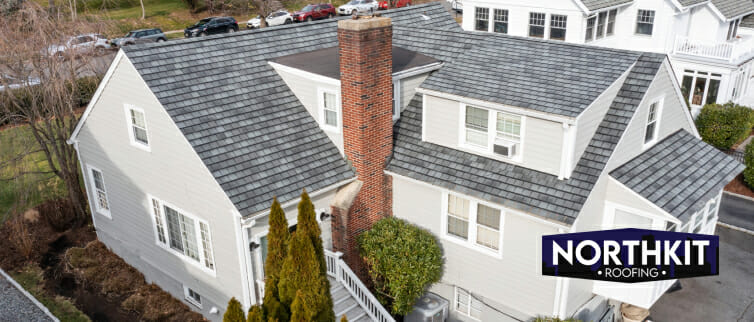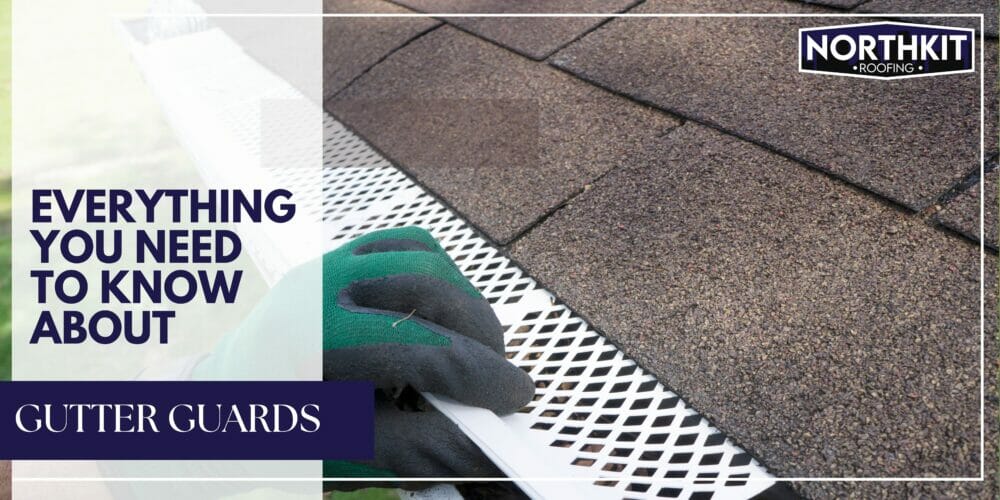Looking for gutter guard solutions in New Jersey? You’re not alone. Our guide, ‘Gutter Guards Guide for NJ Homes,’ is here to help. Many NJ homeowners are seeking better ways to maintain their gutters
Gutters are unsung heroes of any home. They perform a crucial role in keeping properties safe from flooding by moving large amounts of water away from the building. However, they can easily get clogged because they collect a lot of dirt, leaves, and other debris. A clogged gutter can cause damage to your roof, siding, and foundation.
Gutter guards installation can be a game-changer for your New Jersey home. Their sleek design not only simplifies maintenance but also enhances the functionality of your gutters.
1. What Are Gutter Guards?
When considering upgrading your gutter systems, consider gutter guards. These are installed along the gutter line of your home in NJ, streamlining water flow and blocking debris. When you have gutter guards installed on your home, you don’t need to worry about climbing a ladder to clean them.
Different types of gutter guards can protect your gutters. They all have similar designs in that they are fitted along the gutter line, but there are some differences in their construction and function. We will discuss different types of guards available for residential use.
2. Types Of Gutter Guards
Understanding different types of gutter guards can help you make an informed choice for your New Jersey home. Gutter guards come in a variety of shapes and sizes — as well as materials. Mesh screens, PVC covers, foam inserts, and surface tension helmets are the most common types of rain gutter guards.
- Mesh Screens: You can fit these aluminum or PVC screens on top of your existing gutters. They let the water pass through large holes in the screen but stopped the leaves and debris from getting inside the gutters. The wind will blow away the leaves and debris later in some cases.
- Foam Inserts: You insert these 4-foot long foam strips into your gutter. These foams keep leaves, pine needles, and other debris from causing clogs. When rain falls on your roof, it rapidly passes through the foam strips with a highly porous design. This lets the water sheet off the roof and right into your gutters — instead of slowing down and letting trash and debris get stuck inside.
- Surface-Tension Guards: The best way to keep gutters clear of leaves, sticks, and other debris. They work by clinging to the front of your gutters’ rounded noses and then carrying the water right into the downspout. Since they’re made of metal, they’re quite durable and can last up to 15 years.
- Brush Guards: Brush gutter guards are relatively easy to install, but they don’t block all types of debris. Smaller debris, such as maple spinners and pine needles can get caught in the bristles. To clean out your gutters and remove smaller debris, you have to take brush gutter guards out completely. Additionally, there is a chance that these guards can get clogged very easily.
- Micro-Mesh Guards: Micro-Mesh gutter guards are made of a fine stainless-steel or plastic mesh that requires minimal keeping. It effectively filters water, keeping out leaves and other debris but allowing rainwater to pass through. In addition, these guards provide a permanent solution for repairing clogged gutters and have a warranty, so you can rest assured about the quality of your product.
3. Material Type For Gutter Guards
In New Jersey, the choice of material for gutter guards is crucial. Options range from aluminum to stainless steel, each offering unique benefits.
- Stainless steel: Aesthetically pleasing and durable stainless steel gutter guards are popular for homeowners. Stainless steel is rust-resistant and designed to withstand extreme weather conditions. They ensure your gutter guard won’t expand, warp, or crack — keeping your gutters safe from blockage and debris.
- Copper: Copper screen & micro-mesh gutter guards are highly resistant to rusting and corrosion. Currently, few guards can truly compare to copper on the market when it comes to durability. Not only does copper last longer than other types of metal, but it also withstands harsh weather — like rain, snow, or sleet — better than any other option.
- Aluminum: Aluminum is a cheaper, lighter metal than heavier metals like steel and copper, but it’s still sturdy enough to protect your gutters from falling branches and general wear and tear. A lightweight aluminum screen gutter guard offers the same sort of protection for people who don’t have overhanging tree branches or other hard objects in their yard.
With these insights into gutter guards, you’re now equipped to make the best choice for your New Jersey home. Remember these tips when selecting and installing gutter guards to ensure your gutters remain free from debris.
Northkit Roofing, your premier roofing and exterior services contractor, proudly serves the entire Northern New Jersey region, including Essex, Sussex, Passaic, Warren, Morris, Bergen, and Hudson counties. Strategically located in Cedar Grove, NJ, we are ideally positioned to service major cities near Cedar Grove, such as Montclair, Bloomfield, and Verona, along with other key areas in the region. Our experienced team is dedicated to assessing your home’s guttering needs and providing top-notch solutions. Contact us today to explore the best gutter guard options for your home, and experience our commitment to quality and customer satisfaction in Northern New Jersey.


